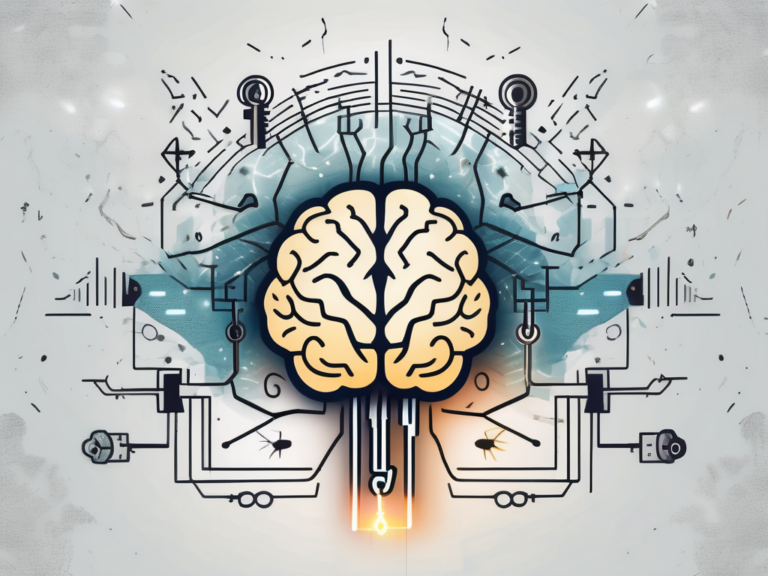Unlocking the Secret Power of the Parasympathetic Nerves
In the realm of human physiology, the nervous system is a complex and intricate network that plays a crucial role in maintaining optimal bodily functions. While much attention is often given to its counterpart, the sympathetic nervous system, a lesser-known hero quietly operates in the background – the parasympathetic nerves. These unsung heroes hold the key to unlocking a world of relaxation, restoration, and overall well-being.
Understanding the Nervous System
Before delving into the fascinating realm of the parasympathetic nerves, it’s essential to grasp the fundamentals of the nervous system as a whole. The nervous system is an incredibly intricate and interconnected web of cells, neurons, and neurotransmitters that allows our bodies to efficiently communicate and respond to the surrounding environment.
Comprehending the workings of this intricate network is no simple feat, but it is an essential building block for understanding the power of the parasympathetic nerves.
The nervous system can be broadly divided into two main parts: the central nervous system (CNS) and the peripheral nervous system (PNS). The CNS consists of the brain and spinal cord, serving as the command center for the entire body. On the other hand, the PNS includes all the nerves outside the CNS, connecting the brain and spinal cord to the rest of the body.
The Role of the Parasympathetic Nerves
One of the two main branches of the autonomic nervous system, the parasympathetic nerves primarily govern the body’s rest-and-digest responses. Unlike their counterpart, the sympathetic nerves, which activate the “fight-or-flight” response, the parasympathetic nerves are responsible for promoting relaxation, slowing the heart rate, and conserving energy.
When the parasympathetic nervous system is activated, it leads to various physiological responses, such as increased digestion and salivation, constriction of the pupils, and decreased heart rate. These responses collectively help the body conserve energy and promote recovery after periods of stress or activity.
The Sympathetic vs. Parasympathetic Nervous System
While both the sympathetic and parasympathetic nerves are integral to maintaining homeostasis, they exhibit opposing effects on the body. The sympathetic nerves enable the body’s rapid response to perceived threats or stressors, elevating heart rate and boosting energy levels. In contrast, the parasympathetic nervous system counters these effects, promoting a state of calmness and restoration.
It’s important to note that the sympathetic and parasympathetic nervous systems work in harmony, balancing each other out to ensure the body can effectively respond to various situations. This intricate interplay between the two branches of the autonomic nervous system highlights the remarkable complexity and adaptability of the human body.
The Science Behind Parasympathetic Nerves
To truly unlock the secret power of the parasympathetic nerves, it is crucial to delve into the mechanics of how they function and the profound impact they have on the body.
The parasympathetic nervous system, often referred to as the “rest and digest” system, plays a vital role in maintaining homeostasis within the body. This intricate network of nerves branches out from the cranial nerves in the brainstem and the sacral spinal cord, exerting its influence on various organs and tissues.
How Parasympathetic Nerves Function
Parasympathetic nerves primarily operate through the release of a neurotransmitter called acetylcholine. This neurotransmitter interacts with specific receptors throughout the body, triggering a cascade of physiological responses that induce relaxation and restoration.
One fascinating aspect of the parasympathetic nervous system is its ability to counterbalance the effects of the sympathetic nervous system, which is responsible for the body’s “fight or flight” response. By promoting activities such as digestion, salivation, and lower heart rate, the parasympathetic nerves help the body conserve energy and recover from stress.
The Impact of Parasympathetic Nerves on the Body
The effects of parasympathetic nerves extend far beyond simple relaxation. Research has revealed their intricate connections with several bodily systems, including the cardiovascular, respiratory, digestive, and reproductive systems.
Furthermore, the parasympathetic nervous system has been linked to the regulation of inflammation and immune responses. By dampening the body’s inflammatory processes, these nerves play a crucial role in maintaining overall health and preventing chronic diseases.
Harnessing the Power of Parasympathetic Nerves
Recognizing the potential benefits of activating the parasympathetic nervous system, many individuals are eager to explore various techniques and strategies to harness its power.
The parasympathetic nervous system, often referred to as the “rest and digest” system, plays a crucial role in helping the body relax, recover, and rejuvenate. By activating this system, individuals can counteract the effects of stress and promote overall well-being.
Techniques for Activating the Parasympathetic Nervous System
Though individual responses may vary, several proven techniques can help activate the parasympathetic nerves effectively. Deep breathing exercises, meditation, gentle stretching, yoga, and engaging in activities that promote relaxation, such as reading or listening to soothing music, are all valuable tools in activating the parasympathetic response.
Additionally, spending time in nature, practicing mindfulness, and engaging in creative pursuits can also stimulate the parasympathetic nervous system. These activities not only promote relaxation but also encourage a deeper connection with oneself and the surrounding environment.
The Benefits of Parasympathetic Nerve Stimulation
Engaging the parasympathetic nervous system not only promotes a sense of calm and relaxation but also offers a plethora of potential health benefits. Studies have shown that parasympathetic stimulation can reduce blood pressure, improve digestion, enhance sleep quality, boost immune function, and even provide mental health benefits.
Furthermore, activating the parasympathetic nerves on a regular basis can help individuals build resilience to stress, improve emotional regulation, and enhance overall quality of life. By incorporating techniques that stimulate the parasympathetic nervous system into daily routines, individuals can cultivate a greater sense of balance, peace, and vitality.
The Parasympathetic Nerves and Health
Given the far-reaching influence of the parasympathetic nerves on the body’s various systems, it is no surprise that they play a crucial role in overall health and well-being. Understanding these connections can provide valuable insights into managing specific health conditions and fostering an optimal state of wellness.
Parasympathetic Nerves and Stress Management
In the fast-paced world we live in, stress has become an ever-present companion for many. The parasympathetic nerves offer a vital tool for managing stress effectively. By activating the relaxation response, these nerves help counteract the detrimental effects of prolonged stress and promote a sense of well-being.
When the parasympathetic nerves are activated, they release neurotransmitters such as acetylcholine, which acts as a natural tranquilizer for the body. This neurotransmitter helps to slow down the heart rate, decrease blood pressure, and relax the muscles, all of which contribute to a state of calmness and relaxation. Additionally, the parasympathetic nerves stimulate the release of endorphins, the body’s natural feel-good chemicals, which further enhance the sense of well-being and reduce stress levels.
The Parasympathetic Nervous System and Digestion
A well-functioning digestive system is paramount for optimal health, and the parasympathetic nerves are intimately involved in its regulation. When activated, these nerves stimulate the release of digestive enzymes, enhance blood flow to the digestive organs, and promote efficient nutrient absorption, all crucial components for healthy digestion.
Furthermore, the parasympathetic nerves also play a role in maintaining the gut-brain connection. They communicate with the enteric nervous system, a complex network of nerves located in the gastrointestinal tract, to ensure proper coordination between the brain and the digestive system. This communication helps regulate appetite, promote satiety, and prevent digestive disorders such as irritable bowel syndrome (IBS) and acid reflux.
The Role of Parasympathetic Nerves in Sleep Regulation
Quality sleep is essential for overall well-being, and the parasympathetic nerves play a significant part in regulating the sleep-wake cycle. By calming the mind and body, these nerves help facilitate a transition into restful sleep and promote a more rejuvenating slumber.
During sleep, the parasympathetic nervous system takes over, allowing the body to repair and restore itself. It slows down heart rate, relaxes muscles, and promotes deep breathing, all of which contribute to a state of relaxation and restfulness. Additionally, the parasympathetic nerves help regulate the release of melatonin, the hormone responsible for maintaining the sleep-wake cycle, ensuring a healthy and balanced sleep pattern.
Understanding the intricate role of the parasympathetic nerves in stress management, digestion, and sleep regulation is crucial for maintaining optimal health. By nurturing and supporting these nerves, we can promote overall well-being and enhance our body’s natural ability to heal and thrive.
Future Research and Potential Applications
As researchers continue to delve into the fascinating world of the parasympathetic nervous system, the potential applications and implications for medical treatment and overall well-being become increasingly apparent.
The Parasympathetic Nervous System in Medical Treatment
The parasympathetic nervous system holds promise as a potential target for therapeutic interventions. Research exploring the use of parasympathetic stimulation in areas such as pain management, cardiovascular health, respiratory disorders, and mental health is paving the way for exciting breakthroughs in medical treatment.
For instance, recent studies have shown that parasympathetic stimulation can be effective in reducing chronic pain. By activating the parasympathetic nervous system, which is responsible for rest and relaxation, it is possible to dampen the pain signals sent to the brain, providing much-needed relief to individuals suffering from conditions such as fibromyalgia or neuropathic pain.
In addition to pain management, the parasympathetic nervous system has also shown potential in improving cardiovascular health. By activating the parasympathetic nerves, heart rate and blood pressure can be regulated, reducing the risk of hypertension and other cardiovascular diseases. This opens up new avenues for non-pharmacological interventions that can complement traditional treatments.
Unanswered Questions and Future Directions in Parasympathetic Nerve Research
While significant progress has been made in unraveling the secrets of the parasympathetic nerves, many questions remain unanswered. The future of parasympathetic nerve research holds promise for further elucidating the intricacies of their functioning and identifying novel therapeutic approaches.
One area of interest is the potential link between the parasympathetic nervous system and mental health. Preliminary studies suggest that parasympathetic dysfunction may contribute to the development of mental disorders such as anxiety and depression. By understanding the underlying mechanisms and developing targeted interventions, it may be possible to improve the lives of millions of individuals affected by these conditions.
Furthermore, the role of the parasympathetic nervous system in respiratory disorders, such as asthma and chronic obstructive pulmonary disease (COPD), is an area that requires further exploration. By investigating how parasympathetic activity influences airway constriction and inflammation, researchers may uncover new therapeutic strategies to alleviate symptoms and improve the quality of life for patients.
In conclusion, while further research is still needed, the potential applications and benefits that lie within the parasympathetic nervous system are both awe-inspiring and transformative. By unlocking the secrets of these hidden nerves, we have the opportunity to revolutionize our understanding of health and well-being. Harnessing their relaxation-inducing abilities can help individuals cultivate a greater sense of peace, balance, and overall vitality. The future of parasympathetic nerve research holds immense promise, and it is an exciting time to be at the forefront of this field.






